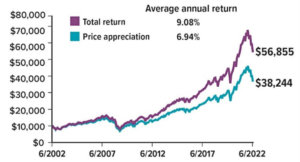John D. Rockefeller, one of the wealthiest Americans in history, loved receiving stock dividends. “Do you know the only thing that gives me pleasure?” he once asked. “It’s to see my dividends coming in.”1
There may be many things other than money that give you pleasure, but you can still appreciate the stabilizing role that dividends might play in your portfolio.
Steady and Dependable
Dividends can be a dependable source of income for retirees and others who want an income stream without selling their underlying investments. If you do not need your dividends for current income, reinvesting these relatively small payments can become a powerful growth engine (see chart). Because dividends are by definition a positive return, they can boost returns in an up market and help balance declining stock prices in a down market.
Whereas stock prices are often volatile and may be influenced by factors that do not reflect a company’s fiscal strength (or weakness), dividend payments tend to be steadier and more directly reflect a company’s financial position. Larger, well-established companies are more likely to pay dividends, but many midsize and smaller companies do as well. Stock funds usually pay dividends based on the dividends of the stocks held by the fund. Some funds focus specifically on dividend stocks.
The Power of Reinvestment
Growth in value of a hypothetical $10,000 investment in the S&P 500 index for the 20-year period ending in June 2022, comparing price appreciation and total return, which includes reinvesting dividends.

Source: Refinitiv, 2022, for the period 6/30/2002 to 6/30/2022. The S&P 500 index is an unmanaged group of securities considered representative of U.S. stocks. Expenses, fees, charges, and taxes are not considered and would reduce the performance shown if included. The performance of an unmanaged index is not indicative of the performance of any specific investment. Individuals cannot invest directly in an index. Past performance is not a guarantee of future results. Rates of return will vary over time, particularly for long-term investments. Actual results will vary.
Quarterly Payments
Dividends are typically paid quarterly but quoted by the annual dollar amount paid on each share, so your annual income from an individual stock can be estimated by multiplying the dividend payment by the number of shares you own. Of course, the income will change if the dividend increases or decreases, or you obtain additional shares.
Dividends are also expressed as yield — the annual dividend income per share divided by the current market price. By this measure, the yield increases as the share price decreases, and vice versa, assuming the dividend payment remains the same. Current dividend yields can be helpful in deciding whether to invest in a stock or stock fund, and historical yields can provide insight into what you might expect from dividends over the long term.
At the end of June 2022, the average yield of dividend-paying stocks in the S&P 500 (about 79% of companies) was 2.18%, but the yield of the S&P High Dividend Index, which focuses on 80 stocks that pay higher dividends, was 4.11%.2
Some Caveats
The flip side of dividend power is that dividend-paying stocks may not have as much growth potential as non-dividend payers that plow their profits back into the company. And there are times when dividend stocks may drag down, not boost, portfolio performance. Dividend stocks can be particularly sensitive to interest-rate changes. When rates rise, as in the current environment, higher yields of lower-risk, fixed-income investments may be more appealing to investors, placing downward pressure on dividend stocks. As long as a company maintains its dividend payments, however, lower stock prices could be an opportunity to buy shares with higher dividend yields.
Investing in dividends is a long-term commitment. Dividends are typically not guaranteed and could be changed or eliminated. The amount of a company’s dividend can fluctuate with earnings, which are influenced by economic, market, and political events. The return and principal value of all investments fluctuate with changes in market conditions. Shares, when sold, may be worth more or less than their original cost. Investments offering the potential for higher rates of return also involve higher risk.
Stock funds are sold by prospectus. Please consider the investment objectives, risks, charges, and expenses carefully before investing. The prospectus, which contains this and other information about the investment company, can be obtained from your financial professional. Be sure to read the prospectus carefully before deciding whether to invest.
1) BrainyQoute.com, 2022; 2) S&P Dow Jones Indices, 2022
Copyright 2006- Broadridge Investor Communication Solutions, Inc. All rights reserved.
Broadridge Investor Communication Solutions, Inc. does not provide investment, tax, or legal advice. The information presented here is not specific to any individual’s personal circumstances.
To the extent that this material concerns tax matters, it is not intended or written to be used, and cannot be used, by a taxpayer for the purpose of avoiding penalties that may be imposed by law. Each taxpayer should seek independent advice from a tax professional based on his or her individual circumstances.
These materials are provided for general information and educational purposes based upon publicly available information from sources believed to be reliable—we cannot assure the accuracy or completeness of these materials. The information in these materials may change at any time and without notice.
*Non-deposit investment products and services are offered through CUSO Financial Services, L.P. (“CFS”), a registered broker-dealer (Member FINRA / SIPC) and SEC Registered Investment Advisor. Products offered through CFS: are not NCUA/NCUSIF or otherwise federally insured, are not guarantees or obligations of the credit union, and may involve investment risk including possible loss of principal. Investment Representatives are registered through CFS. Coastal Federal Credit Union has contracted with CFS to make non-deposit investment products and services available to credit union members.
CFS representatives do not provide tax or legal guidance. For such guidance please consult with a qualified professional. Information shown is for general illustration purposes and does not predict or depict the performance of any investment or strategy. Past performance does not guarantee future results.
Trust Services are available through MEMBERS Trust Company. CFS* is not affiliated with Members Trust Company.






